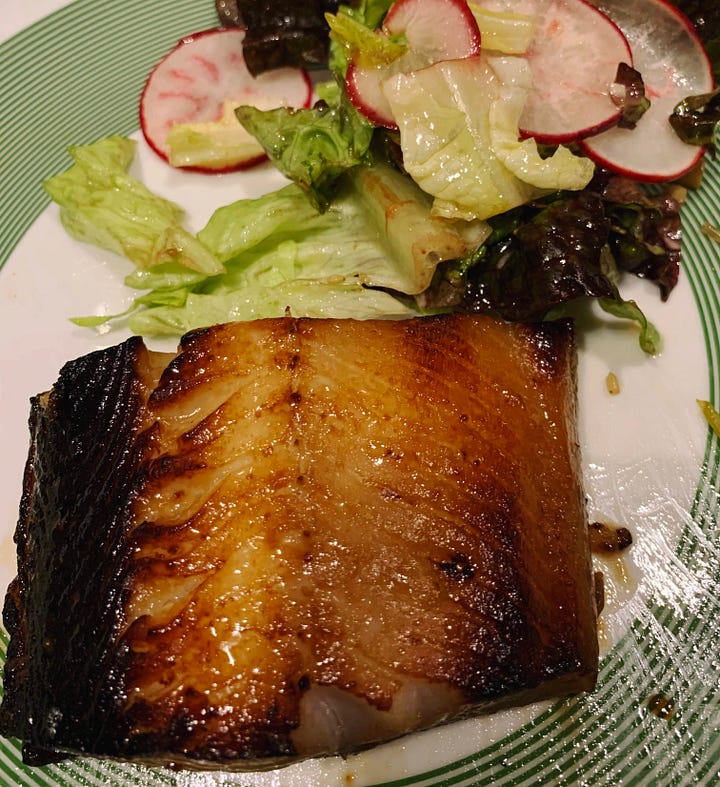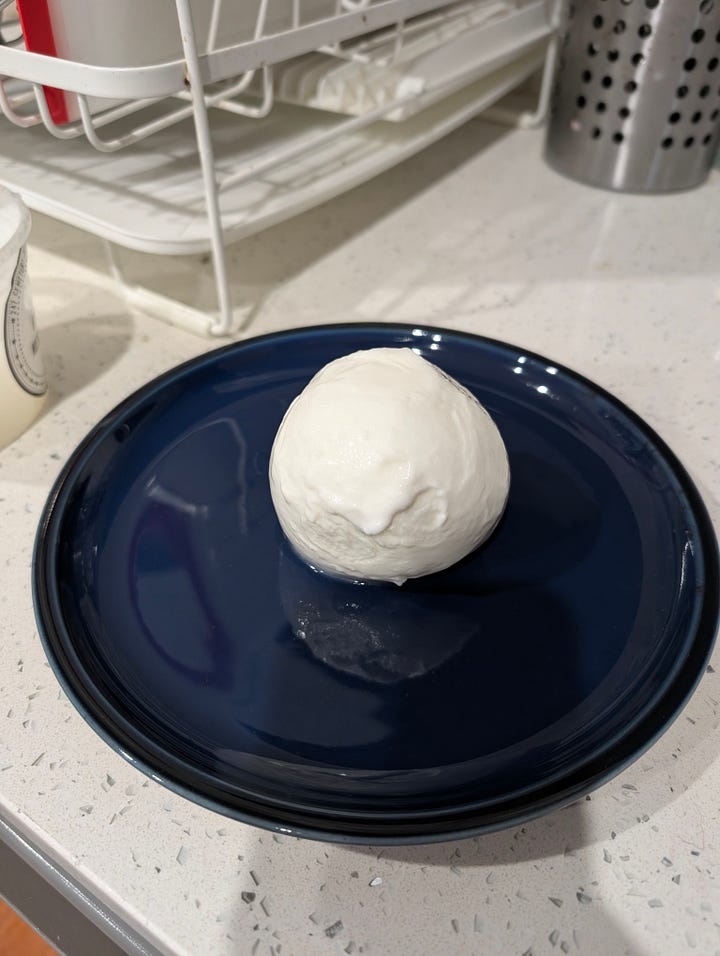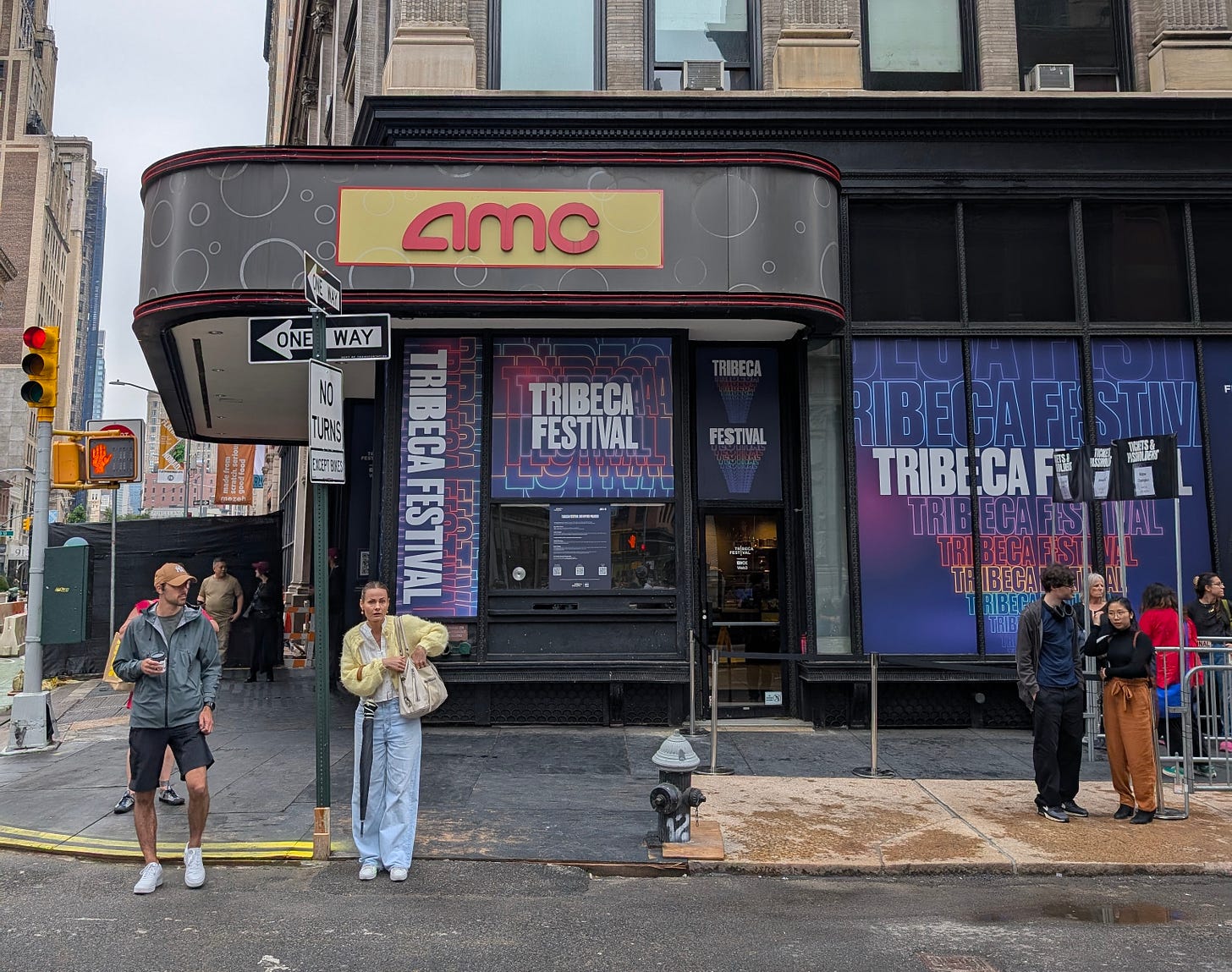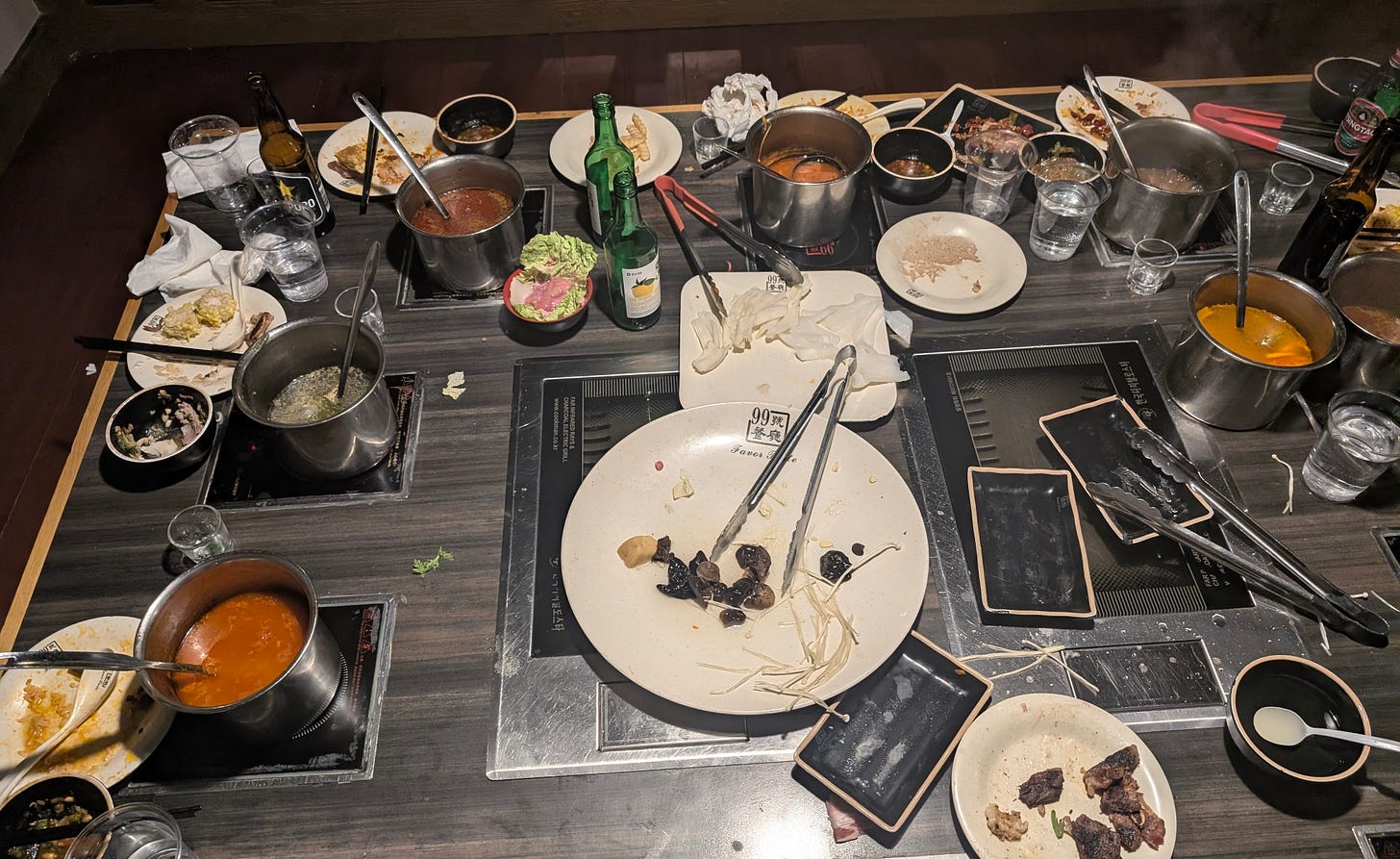Seven More Movies That I Watched at This Year’s Tribeca Festival
Notes on luxury sushi, KBBQ dine and dashers, class stratification in Egypt, undercover improv, two New Yorkers on the verge of nervous breakdowns, and the depravity of antebellum nostalgia.
Here's a rundown of all the other films I was able to watch during the Tribeca Festival, along with (New York specific) food and drink-themed Tasting Notes where applicable!
Nobu
Opens at the Angelika on June 27, with national expansion beginning July 4.
The story of your favorite finance bro’s favorite sushi joint. From humble beginnings, Nobu Matsuhisa built a restaurant and hotel empire, bringing sushi into the realm of the refined by integrating global cuisines into a traditional Japanese framework. His name is synonymous with “casual luxury.” It’s hard to overstate Nobu’s influence on the dining world, but Matt Tyrnauer has done exactly that in his hagiographic profile. This film would not have been out of place in Tribeca X, the festival’s sidebar for “brand-driven storytelling.” (It should be noted that Robert De Niro co-founded both the Tribeca Festival and Nobu Hospitality, LLC.)
Amidst the talking head interviews and functional delivery of Nobu’s journey to success are two worthwhile scenes, which blessedly play out in vérité. The chef pays a visit to the Nobu in Cabo for a quality check. As the local chefs and corporate flunkies nervously glance at the camera, he samples the dishes prepared for him, rejecting them for too finely mincing the cilantro or saucing a plate with stripes instead of his preferred dots. Later in the film, we witness a contentious board meeting. As one of the partners provides a status update on forthcoming locations, it becomes clear that Nobu has lost track of all the restaurants and hotels that bear his name. (To be fair, there are nearly 100 of them.) Then, De Niro questions the intention behind a new partnership with a hotel chain, believing that they’re lending those properties a sense of prestige without getting much back in return. He asks the finance guy, “What’s the benefit to us?” The reply: “Money!”
As the actor positions himself as a defender of the brand’s prestige and legacy against unchecked profit-seeking, Nobu himself remains silent. Tyrnauer declines to follow up on these strands of inquiry. The director had final cut on his film, and his subjects didn’t see the film at all until it premiered. This comes as a genuine surprise to anyone watching. I have a pet theory that the best documentaries come from filmmakers who are, at best, mildly reverent to their subjects. Certainly not admirers, or worse, fans.


Tasting Notes: The documentary did make me think about making a reservation at the Nobu in Tribeca, which was the first in what eventually became a sprawling empire. Then I looked at the prices on the menu and decided against it. I’ve made the famous miso black cod at home many times, and it’s insanely good, though my version certainly is not as elegantly plated. Nobu brought Nikkei cuisine, a fusion of Peruvian and Japanese flavors, to the global stage, and you don’t have to go to his restaurants to experience it. I haven’t been back in a few years but I always recommend Llama San. For a hot minute you could find yellowtail crudo with jalapeño on the menu of nearly every small plates restaurant in New York.
People and Meat
Seeking distribution.
A meal at Nobu would be a pipe dream for the dine and dashers in Yang Jong-hyun’s tragicomedy. The film centers on a trio of indigent elders who can’t afford to buy meat at all, owing to meagre pensions and a lack of close kin. They take matters into their own hands, dining at KBBQ restaurants across Seoul and dashing when it comes time to pay the bill. It’s fun watching them gin up different ways to skip out on the check, but in the third act, sentimentality overwhelms the picture. This reminded me a lot of How to Make Millions Before Grandma Dies, a Thai breakout that also used a fun premise to deliver a social message about how we need to treat old people better. Both of these films tug at the heartstrings, bringing many viewers to tears, but I felt nothing. This style of movie just doesn’t do it for me.
Tasting Notes: Everyone has their own favorite KBBQ restaurant in New York. Mine would be Yoon Haeundae Galbi, yours is probably different. For non-BBQ Korean fare, the TikTok crowd found out about Cho Dang Gol so I can’t go there anymore. It’s not Korean, but this past weekend I had hot pot for the first time in a couple years; 99 Favor Taste is my usual go-to, and they also offer KBBQ. The restaurant all you can eat, and reader, I did.
Happy Birthday
Seeking distribution.
This unflinching drama by Sarah Goher lays bare the economic stratification in her society without resorting to mawkish sentimentality. When we first meet Toha (Doha Ramadan, in a remarkable child performance), she’s playing with Nelly (Khadheeja Ahmed), giggling and running around. But the young girls aren’t sisters, or even friends; Toha is a child maid hired to a wealthy family in Cairo. The birthday hinted at by the film’s title is Nelly’s, and a big party is planned for her. Meanwhile, Toha has never celebrated her own. Sent away to spend the day with her real family, Toha embarks on an odyssey back behind the walls of Nelly’s gated community. Over the course of one consequential day, she finds herself up against Egypt’s rigid class hierarchy, the strictures of which the young girl is just beginning to understand. The Tribeca Festival juries gave this film three awards: Best International Narrative Feature, Best Screenplay in an International Narrative Feature and the Nora Ephron Award (female filmmakers).
Deep Cover
Now streaming on Amazon Prime Video.
In this entertaining action comedy, an improv instructor (Bryce Dallas Howard) and two of her students (Orlando Bloom and Nick Mohammed) are enlisted by an undercover cop (Sean Bean) to help bust low-level criminals. Things go awry when the trio “yes, and” themselves into infiltrating one of London’s biggest drug rings. As the plot escalates towards full-on mayhem, the improvisers come to find that they’re not the only ones making things up as they go along.
The screenplay was written by Derek Connolly & Colin Trevorrow and Ben Ashenden & Alexander Owen, but one hopes a good amount of the dialogue was improvised. Because unlike most improv comedy, the jokes almost always land. (Sorry to my comedy practitioner friends, whose invitations I always politely decline.) What Deep Cover does share with improv is that neither offers much more than fleeting laughs and temporary thrills, but it’s a delight just the same to watch these committed performers who, it turns out, can be no one but themselves. Through its cinematography, costumes, and score, the film borrows the aesthetics of a 1970s American crime thriller, which lends Tom Kingsley’s picture a special flair.
On a String
Seeking distribution.
Juilliard-trained violist turned stand-up comic Isabel Hagen channels Frances Ha in her debut as a filmmaker. She also stars in her film as Isabel, a Juilliard graduate trying to make a living as a musician in New York. Her day-to-day existence consists of living with her parents, supplying background noise for ritzy galas as the member of a tenuous string quartet, and giving lessons to the 8-year-old daughter of a married lawyer who may or may not be into her. On a String has its charms and a lived-in realism (the musicians are played by real-life professionals) but the film is clearly the work of a first-time director. The pacing is surprisingly stilted given that Hagen’s other careers are so dependent on perfectly nailing the timing. Too often it feels like this film, like its main character, is a work in progress.
Tasting notes: There are plenty of dinner table conversations in On a String, but everything is takeout. These musicians have neither money nor time, a vicious cycle of draining the wallet on Chinese delivery. A classically trained musician I know tells me that working in music “is a deeply tiring life, analogous to chef life.” Your work is making stuff with your body, so you don’t want to keep doing that when you’re off the clock, so to speak.
Fior Di Latte
Seeking distribution.
If the thought of Tim Heidecker huffing perfume like poppers appeals to you, you may love this whimsical, dark exploration of a man's addiction to nostalgia and fantasy. Heidecker plays Mark, a creatively frustrated playwright and lyricist who spends his days bidding for Hollywood memorabilia on eBay. Crashing in his West Village apartment is Francesca (Marta Pozzan), an aspiring writer he met on a trip to Florence. Crashing out is Mark, who brushes off her attempts at intimacy. Instead he sniffs a pair of boxers soaked in a perfume he bought in Italy—the bottle shattered in his suitcase—bringing forth vivid memories of that idyllic summer vacation. A well-intentioned laundry run sends him on a desperate quest to recreate the rare scent, assisted by the likes of Julia Fox (a Meisner-trained actor), Gina Gershon (the proprietress of an Italian deli), and Kevin Kline (a role too fun to reveal here). Charlotte Ercoli, directing her first feature with a steady hand, channels the best of New York movies by re-envisioning the West Village as a small town populated with capital-C Characters.
Recently, there have been other movies about emotionally stunted manchildren traipsing around Manhattan, many of them great. But unlike Sebastian Stan’s facelifted misanthrope in A Different Man or the weaselly jewelry dealer played by Adam Sandler in Uncut Gems, we’re not meant to have any sympathy for Heidecker’s loathsome anti-hero, who has no redeeming qualities whatsoever. At the risk of dipping into gender essentialism, I’d venture to say the difference in these characterizations comes down to Fior Di Latte having been written and directed by a woman, whereas the male filmmakers behind the other films can’t help but identify with their protagonists.
This was my favorite of all the films I saw at Tribeca. Really weird and not for everyone (there are even a couple musical numbers) but I absolutely vibed with it.


Tasting Notes: In Italy, mozzarella is generally understood to be made with the milk of water buffalos, while the cow’s milk equivalent is called fior di latte. The latter name sounds fancier, but it doesn’t have as much fat and protein. Like the movie’s identically named perfume, it’s a simulacrum of the real thing. One friend of mine is quite an aficionado of fresh Italian cheese. He tells me that he likes both buffalo mozzarella and fior di latte, but with a slight preference for the former, owing to a tangier flavor and softer mouthfeel. On the other hand, fior di latte is cheaper. At the Union Square Greenmarket, you’ll find a bevy of buffalo milk cheeses (and meat) from Riverine Ranch. That’s where he gets his fresh mozz, which I can confirm is excellent. I also really love their aged farmstand cheese. If you want to try cow’s milk variation, he recommends Russo’s; they have locations in the East Village and Park Slope.
Natchez
Coming to PBS eventually; theatrical release plans TBA.
A resident of Natchez, Mississippi describes his city as “a complicated little town” with a “deep, rich, peculiar history.” That history includes having once been the second-largest slave market in the United States and building its economy on plantation tourism. Suzannah Herbert’s patiently observed documentary is an artifact of late-stage Bidenism: a nation’s collective reckoning with its racist history battling against instinctual revanchism. In the post-George Floyd moment, some of the longtime proprietors of antebellum homes seek to integrate the perspectives of the enslaved into their tours, no matter how awkwardly. (In a word, they’ve gone woke.) Other owners either prefer the façade of escapism and/or are outright racist. You won’t believe what some of these people say in front of the cameras.
Perhaps the way forward lies outside of the plantation home. A preacher offers a different kind of tour, one that drives guests around the city to show them historical sites of enslavement, Reconstruction, and Jim Crow. Park rangers also seek to expand the definition of antebellum tourism by refurbishing the former slave market. One Black woman buys a property, only to discover it was once a slave dwelling. She joins the association of antebellum homeowners, becoming its first Black member, and gives tours that reveal the experiences of the enslaved.
Herbert was filming intermittently from the fall of 2022 through the summer of 2024, wrapping just months before a reactionary won back the presidency and declared a fatwa against Diversity, Equity, and Inclusion. I’m curious as to whether the token overtures from the white plantation owners and the municipal government have faded away. But Herbert’s excellent film, in capturing these duelling visions of history without demonizing anyone involved, gives one hope that heritage isn’t hate, and that liberal democracy will rise again.
Catch Up
I wrote fuller reviews of Just Sing, a heartwarming documentary about a collegiate a cappella team full of pop bangers, as well as a take on The Rose: Come Back to Me, which retraces the independent Korean rock band’s journey from Seoul to Coachella.
A More Pitch Perfect Union
If you’re starting to see more red carpets in front of downtown Manhattan movie theaters than usual, that’s because the Tribeca Film Festival has officially kicked off! Running from June 4–15, Tribeca has become known for premiering a lot of celebrity-driven films, with a particular focus on pop stars. (Skimming the catalogue, there are documentaries or…
The Rose and The Thorn
The Tribeca Festival wrapped up over the weekend, with a supremely overwhelming lineup of 120+ feature films and a flotilla of shorts that screened throughout Manhattan over the past week and a half. That doesn’t even include the video games, podcasts, and branded content that also make up the …
Coming to theaters this weekend
The very good “coming of old age” drama Familiar Touch comes to the Film Forum on June 20, with limited expansion to follow. Here’s a condensed version of what I wrote when it played at New Directors/New Films a couple months ago.
In her career as a choreographer and video artist, Sarah Friedland has long been attuned to the motion of bodies, with subtle movements conveying the littlest big things. Such attention translates well to her debut narrative feature, an unsparing yet compassionate portrait of a woman grappling with dementia. Newly moved into assisted living, Ruth (Kathleen Chalfant) may no longer recognize her son, but she can perfectly recite her recipe for borscht.
Working in collaboration with the residents and staff of a real facility in Pasadena, Friedland employs an observational style reminiscent of a Frederick Wiseman documentary. You keenly feel Ruth’s loss of autonomy, particularly in no longer being able to cook her own meals. Also spotlighted are the responsibilities balanced by the home’s caregivers, particularly with a stressed yet gracious nurse (Carolyn Michelle) and a sardonically charming doctor (Andy McQueen). The most astonishing acting turn comes from H. Jon Benjamin, who plays her son. The Archer voice actor’s ironic deadpan has softened with age into a wounded sensitivity. His scenes with Chalfant are the most outwardly heartbreaking scenes in an otherwise restrained film.
Tasting notes: That borscht recipe recited by Ruth comes from the Moosewood Cookbook by Mollie Katzen (who served as a consultant on this film).















amazing newsletter as always….but commenting to say that i need buffalo mozz injected into my veins immediately.